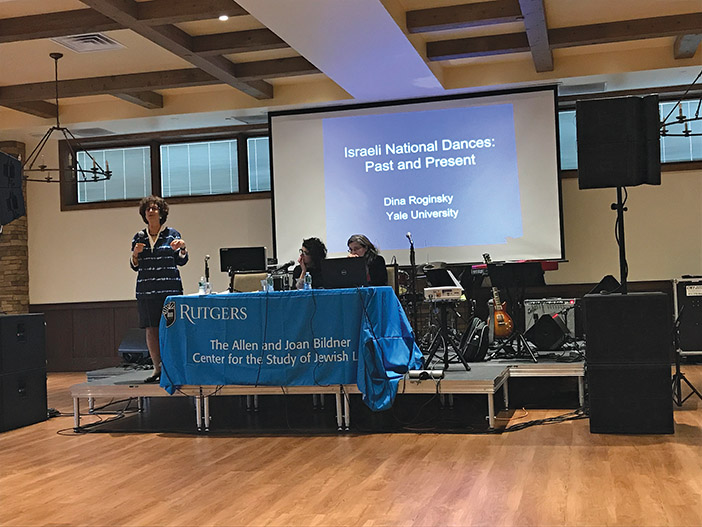

Israel’s 70th birthday was celebrated in a big way on the evening of Thursday, April 19, at Rutgers University in New Brunswick. The event drew about 200 community members as well as students to hear a presentation about the history of Israeli music and dance and was followed by a concert of Israeli music.
What comes to mind when you think of Israeli folk dance? Groups of people holding hands while dancing in a circle? Dr. Dina Roginsky of Yale University took the audience on a tour of the history of Israeli dance from pre-state to the present day. Historically, pre-state dancing included the peasant dancing of the agricultural communities and the devotional/worship dancing of the religious Zionists. The second era of dancing incorporated the European-Israeli folk dances, Mizrachi ethnic dances and the dances of minority groups indigenous to the country. Today’s dancing focuses on the Mizrachi style as the major trend.
While dancing remains a popular pastime throughout Israel, the style of dancing has changed along with the politics. Roginsky noted that the popular hora originated on the kibbutz with people dancing while holding hands as part of the socialist collective. Today’s dancing is more individualistic as reflective of the democracy the country has become. Each person performs the same dance steps, but they don’t hold hands.
Informal folk dancing sessions remain popular across Israel, where it is common to see groups of people stop what they are doing and dance when someone puts on music in a public place.
The music of Israel is uniquely tied to the country’s immigrant culture. According to Dr. Galeet Dardashti of JTS, the earliest European immigrants sought to create a new culture that tied their tradition to the ways of the new country. They meant to break away from Diasporic culture and create something new in pre-1950s Israel that included the Middle Eastern elements. Israeli music was mainly European/Ashkenazi with a mild Middle Eastern flavor. As Mideast and African Jews came to Israel, they noticed that they did not hear themselves on the established radio stations. Their musical tastes created an “underground” style, published on cassettes but not played on the radio. That changed in the 1990s as additional radio and television stations were added. By then, Mizrachim were more than half the country’s population, ratings soared and the music became popular among all listeners.
Pop music singers, such as Sarit Hadad, brought songs melding Mizrachi and pop music to the hit parade mainly with voice inflections and instrumentation. The latest trend involves concerts where piyutim (religious poems set to music) are sung by religious and secular artists on the same stage.
Dardashti noted that Israeli singer Rita released an album sung entirely in Persian. Other Israeli artists regularly perform in the languages of their ancestry (Turkish, Arabic, Persian) and are huge hits in the Arab world via YouTube.
Alan Cooper and Carol Berman came to the event from Highland Park, noting that “if you can’t celebrate Israel’s 70th in Israel, this is the next best thing.”
Elise Gonzales, also of Highland Park, attended the event as well, and enjoyed delicious Israeli cuisine beforehand at Hillel’s Bistro70 café. “It’s important to have as many people as possible in celebration of Israel.”
The program concluded with a concert by IsraBand, an Israeli cover band that provided the audience with an authentic Israeli music experience through a variety of the biggest hits in Israeli music. The songs included popular hits by Arik Einstein, Shlomo Artzi, Kaveret (known in the United States as “Poogy”), Moshe Ben-Ari, Eyal Golan, Yehudit Ravitz and others. The entire audience sang along to Naomi Shemer’s “Yerushalaim Shel Zahav,” and Kaveret’s “Yo Ya” brought the entire room to its feet to dance, as young and old alike joined in celebration of Israel’s 70th birthday as well as its musical heritage.
The event was presented in partnership with NJPAC, Rutgers’ Allen and Joan Bildner Center for the Study of Jewish Life and Rutgers Hillel, and was funded in part by the Ruth and Alvin Rockoff program fund.
By Deborah Melman













